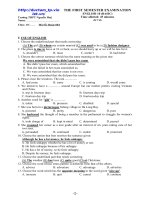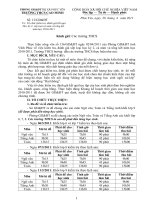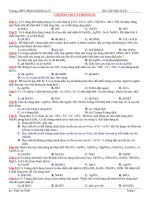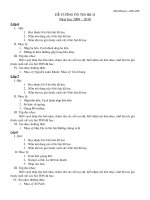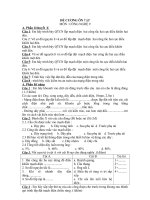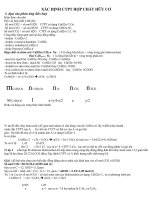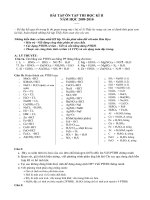Ôn HK 2 (10) - 26-4
Bạn đang xem bản rút gọn của tài liệu. Xem và tải ngay bản đầy đủ của tài liệu tại đây (68.76 KB, 2 trang )
ÔN THI HỌC KỲ II – KHỐI 10 ~ 26-4-2011
I. Choose the words in each group that has the underlined part pronounced differently
from the rest.
1. A. scientist B. natural C. tiny D. plant
2. A. spread B. introduce C. destroy D. soldier
3. A. plumber B. establish C. abroad D. benefit
4. A. classical B. composer C. answer D. serious
5. A. Phillip B. phrase C. graphic D. Stephen
6. A. math
ematics B. anyth
ing C. auth
or D. south
ern
7. A. bath
B. bath
e C. alth
ough D. cloth
ing
8. A. th
ief B. th
us C. th
ese D. th
eir
9. A. they B. those C. thing D. then
10. A. film B. Jim C. kind D. him
II. Choose the answer (A, B, C, or D) that best fits each blank.
1 eight musicians in the band.
A. They will consist B. They are being C. There is D. There will be
2. We are very grateful your help.{ grateful to someone for [doing] something}
A. to B. at C. with D. for
3. He wear a pair of glasses.
A. used to B. used C. use D. use to
4. Do you remember Mrs Goddard, taught us English composition? - I certainly do.
A. who B. whom C. that D. which
5. It was too small. It wasn't
A. enough big B. big enough C. fairly big D. rather big
6. The crowd at a football match are often
A. excite B. excited C. exciting D. being excited
7. Don't forget home as soon as you arrive at your destination.
A. to call B. calling C. having called D. to be called
8. They wanted to know if the woman had died of the rare
A. illness B. pain C. ache D. hurt
9. NewYork, Tokyo and Paris are all
A. big cities B. capital cities C. central cities D. in Europe
10. I'll see you
A. short B. after C. next D. later
11. Go and sit Richard.
A. beside B. next to C. by D. All are correct.
12. This is the boy father is an architect.
A. who B. his C. whose D. which
13. I English for 6 years now.
A. am studying B. will have studied C. have been studied D. have been studying
14. My uncle has given up
A. smoke B. smoking C. to smoke D. smoked
15. Have you been Ho Chi Minh City yet?
A. Until you not B. Already not C. Still not D. Not yet
16. I've got a new grammar book. -
A. How many cost? B. How much price? C. How much is it? D. How much you pay?
17. At four o'clock Mr Huchinson still had some to do in his garden.
A. work B. job C. effort D. take
18. He has always been generous and he still
A. has been B. was C. is D. has
19. Thank you for me.
A. invite B. invited C. inviting D. invitation
20. The lesson is difficult that nobody can understand it.
A. so B. such C. very D. a lot
21. That umbrella is
A. our B. our's C. ours D. to our
22. What to the beggar?
A. did happen B. was happened C. happening D. happened
23. Please smoke in the room.
A. smoke B. smokes C. smoking D. smoked
24. We've got food in the house.
A. plenty of B. plenty C. lots D. very much
25. Up to now I a lot of information about her.
A. would learn B. have learnt C. have learn D. will learn
26. Mrs Smith, husband is a diplomat, gives cooking lessons.
A. whom B. who C. whose D. who's
27. He was arrested. He
A. escaped B. was caught C. was stopped D. was seen
28. He heard a noise coming from the bar.
A. which was B. who was C. that is D. which is
29. I live a few yards the bus stop.
A. off B. away C. from D. with
30. We in this village 10 years ago.
A. have lived B. were living C. used to live D. live
31. I have a lot of books, which I haven't read.
A. many of B. most of C. some of D. All are correct.
32. I'm sorry. I haven't got any money. I've my wallet at home.
A. missed B. left C. let D. forgotten
33. If someone into the store, smile and say, "May I help you?"
A. comes B. came C. would come D. could come
34. The children have gone
A. for shopping B. to shop C. shopping D. to make shopping
35. Life on earth destroyed unless nuclear tests stop.
A. would be B. will C. will be D. is
36. The doctor succeeded the patient's life.
A. when he saves B. saving C. to save D. in saving
37. She eats too much and now she is
A. weighed B. weight C. overweigh D. overweight
38. Lots of people yoga to relax.
A. give up B. take up C. do D. make
39. He spent a lot of time reading books.
ÔN THI HỌC KỲ II – KHỐI 10 26-4-2011 ÔN THI HỌC KỲ II – KHỐI 10 26-4-2011
A. on B. at C. in D. Ø
40. A musician is a person music.
A. who plays B. whose C. who play D. which plays
III. Fill in each blank with a suitable relative pronoun.
1. I have always wanted to visit Moscow, …… is the capital city of Russia.
2. The town …… I was born and grew up was destroyed in earthquake.
3. The award was won by Dennis Johnson,…… the coach highly respects.
4. I’m looking for an electric can opener …… also can sharpen knives.
5. People …… live in glass house shouldn’t throw stones.
6. The problems …… Linh has seem insurmountable.
7. The man …… I introduced you to last night may be the next president of this city.
8. Cathy is trustworthy. She's a person upon …… you can always depend.
9. The earth, …… is the fifth largest planet in the solar system, is the third planet from the sun.
10. I read about a girl …… life was saved by her pet dog.
IV. READING 1. Fill each of the numbered blanks in the following passage with suitable
words.
TEENAGERS AND SPORT
It’s quite rare to meet teenagers who don’t like sports. When you are young, you know how
important… (1) … to do physical exercise if you want to be healthy and strong, and for that
reason you often concentrate on just one sport with so …(2) … enthusiasm that in the end you
can’t live without it. The problem is, though, that as you grow up you have less and less spare
time. At your age you have to study harder if you want to get good marks to go to university,
with perhaps only one afternoon a week to do any sport. This happens just when you are at the
best …(3)… for many sports, such as gymnastics and swimming. By the time you finish all your
studies you will probably be too old to be really good at sports like those, but if you spend
enough time on… (4) … while you are young, then one day you will find that you are very good
at your sport but too old to study, and you will find it …(5) … to get a good job. Somehow, it
doesn’t seem fair.
1. A. this is B. you are C. it is D. things are
2. A. keen B. many C. great D. much
3. A. stage B. age C. period D. time
4. A. training B. practice C. exercise D. sporting
5. A. impractical B. unlikely C. improbable D. impossible
READING 2. THE HO CHI MINH MUSEUM (NHA RONG HARBOUR)
Nha Rong Harbour, or Uncle Ho's Museum is situated on the junction of the SaiGon River, at
the end of Nguyen Tat Thanh Street. On June 5
th
1911, it was here that President Ho Chi Minh
boarded the ship "Latouche Treville Admiral" to set out on a long journey to find a solution to
liberate the country. Nha Rong was formerly the representative office of the French Maritime
Transport Company (a 'subsidiary of the French shipping company "Messageries Pharitimes").
The office was built in 1862 and used as the residence for the general manager as well as the ice for
selling boat tickets. It has been called Nha Rong (The Dragon House) because there are two
statues of dragons on its roof It was in November 1862 that first ship left Nha Rong Harbor.
On September 3
id
1979, the HCM City People's Committee made a decision of converting
Nha Rong Harbour to "Uncle Ho's Museum" (The Ho Chi Minh Museum at Nha Rong
Harbour). Plenty of pictures and items relating to President Ho Chi Minh's revolutionary life are
shown inside. Since then, the museum has greeted millions of visitors from all over the
country as well as from foreign countries.
1. Where is Nha Rong Harbour situated?
2. When did Nguyen Tat Thanh set out from Nha Rong Harbour to find a solution to liberate the
country?
3. Why has this building been called Nha Rong (The Dragon House)?
4. What happened in Nha Rong Harbor in November 1862?
5. What can visitors see when they visit Nha Rong Harbour?
V. Fill in the blank with the correct form of the verbs given in brackets.
1. If we (work) … all night, we (finish)… in time; but we have no intention of doing it.
2. If we (have)… a submarine now, we (use)…. it to investigate the seabed.
3. Were he ten years younger, he (take) … part in the voyage around the world.
4. Should you come late, they (not let) ….you in.
5. He might get rid of his cough if he (not smoke) … so much.
6. If someone (give) … you a boat what you (do)… ?
7. Now we've lost! If you. (write)… down Mary's direction, this (not happen)…
8. Why don't we emigrate? If we (live)… in Australia, at least the weather (be)… better!
9. If my uncle (not miss)… the train, he (be)… here by now.
10. Thanks to Dr Jones, I'm still alive! If it (not be) … for her, I (be) … dead for certain.
VI. Find a mistake in the four underlined parts of each sentence
1. Before I went to bed last night, I have already finished my homework.
A B C D
2. Jane had sent a letter to her university after she had received her scholarship cheque.
A B C D
3. Mrs. Hoa had worked at the primary school for twenty years after she retired.
A B C D
4. Minh told me yesterday that he had studied English from 2004.
A B C D
5. Loan’s party had already started in the time I got there.
A B C D
6. I advise you study how to use a computer at once.
A B C D
VII. Use the given information to make conditional sentences
1. I was sick yesterday, so I didn’t go to class. If ….
2. Because Lan never eats breakfast, she always overeats at lunch. If …
3. Phong didn’t finish unloading the truck because Vinh didn’t help him.
4. Tân was late to his own wedding because his watch was ten minutes slow. If …
5. I don't take the bus to work every morning because it's always so crowded. If …
6. I didn't bring extra money with me because you didn't tell me we were going to dinner after
the movie. If …
7. Sang didn't know that Prenn Highway was closed so he didn't take an alternative route. If …
8. Because I lost my key, I had to pound [đấm] on the door to wake my roommate when I got home
ÔN THI HỌC KỲ II – KHỐI 10 26-4-2011 ÔN THI HỌC KỲ II – KHỐI 10 26-4-2011
last night. If …
9. I'm tired today because I went to bed late last night. If …
10. The wind is blowing hard, so I won't take the boat out for a ride. If …
ÔN THI HỌC KỲ II – KHỐI 10 26-4-2011 ÔN THI HỌC KỲ II – KHỐI 10 26-4-2011


